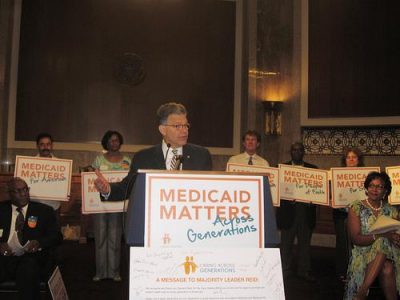Interdependence is the single word that embodies the Caring Across Generations (CAG) campaign, for me.
Solidarity! Faith! History! Unity! Women! These are the words that resonated with other supporters of the movement. In a circle in the ballroom of the Washington Hilton last week, we shouted our words and stood with our hands entwined, linked together by our common vision for transforming the culture of care. The circle marked the end of the Care Congress and the beginning of a movement.
Jessica Lehman, leadership organizer for Hand in Hand: The Domestic Employers Association, and herself an employer of home health aides shared her personal care story. She described how the care giving relationship is more than people caring FOR her: “Interdependence is what Caring Across Generations is all about,” said Lehman.
As the more than 700 person crowd divided into “tracks,” for the afternoon, the erupting fervor did not dissipate. A highly energized ACTION group proceeded to Capitol Hill to testify on the importance of protecting Medicare and Medicaid and to hear from Senators Al Franken (D-MN) and Sheldon Whitehouse (D-RI) on these issues.

Sen. Franken speaks out in support of Caring Across Generations. Photo by Jobs with Justice.
The other half of the Congress attendees stayed at the hotel and attended workshops. I attended one about movements and organizing. I felt invigorated after collaborating to outline steps that can be taken to build a care movement that is premised on the ideal of showing dignity and respect to all persons. To hear and see individuals who hold a forward way of thinking about care relationships has and will continue to spur the movement for reform.
One such “care narrative” came from Rahnee Patrick, a disabled woman and disability rights activist. Individuals with disabilities are continuously in a “negotiation for independence,” she described. Even though a person helps to care for her body she, herself, “brings a lot to the table.” The care relationship is not a passive exchange. All individuals have agency over their wants and needs. Those calling upon care services do not hide the fact that dependence and interdependence are ingrained in the human condition. Understanding this connection and placing value on the relationships developed through their work is what allows domestic workers to feel proud of the direct care services they provide.
Another care narrative that is often overlooked is the unpaid kin care relationship. The 2011 AARP study, “Valuing the Invaluable,” finds that family caregivers often place their own health on the backburner to ensure that a loved one is well cared for. Juggling the care needs of an elderly or disabled family member with the demands of work can be strenuous and, if not well managed, can lead to burnout. To avoid burn out without compromising the quality of care being provided working hours may be scaled back. This approach, however, is not entirely favorable.
Hundreds of thousands of dollars in income are lost in a lifetime, the AARP study reports, of caregivers scaling back work hours. An alternative approach, suggests Susan Mintz of the National Family Caregivers Association is to broaden our definition of “family” and extend care relationships into the community.
The Caring Across Generations campaign is acknowledging the many forms of caregiving relationships, including unpaid family and friends providing care for loved ones. One of the policy proposals that the CAG campaign is evaluating in order to support individuals and families, is a tax credit for caregivers (along with other supports like social security credits, paid work leave, and expanding access to subsidies).
When our society begins to show care workers, seniors, and persons with disabilities dignity and respect, we can overhaul the current image of care and being to sculpt a new care story, one that reflects our values and acknowledges the many forms of caregiving relationships.
Jessica Cutcliffe is an intern at the Break The Chain Campaign, a project of the Institute for Policy Studies.
